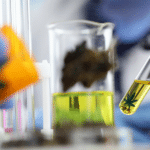Scientists in at Western New England University in Springfield, Massachusetts, briefly review 10 studies that shed light on how CBD might interact with cancer treatments.
Half of these studies examine how CBD can affect the metabolism and distribution of anticancer drugs, a topic Project CBD has been discussing for years. As the authors describe, large doses or regular use of CBD can both increase and decrease the levels of different drug-metabolizing enzymes called CYPs, which will alter the effectiveness of a pharmaceutical. At even higher doses, CBD can also modify the expression of certain proteins produced by cancers to resist chemo. In mice, CBD prevents or reduces neuropathy caused by the chemotherapy paclitaxel. (The condition where even mild stimulus causes pain is called allodynia.) The New England scientists also highlight a few papers in which CBD synergizes with chemotherapy, improving the survival from glioblastoma (a severe brain cancer) and multiple myeloma (a type of bone cancer). These interactions make clear that CBD can influence cancer treatment, but they don’t shed much light on how many people might be helped (or hurt), and how to identify those groups of people. Yet THC is already approved for treating wasting syndrome in cancer patients. Despite the schedule 1 status of cannabis, it behooves the medical community to set up trials that take advantage of the already-existent group of people using cannabis while treating cancer. There are some legitimate concerns and many compelling possibilities.
Adrian Devitt-Lee is a research scientist and longtime Project CBD contributor. © Copyright, Project CBD. May not be reprinted without permission.







